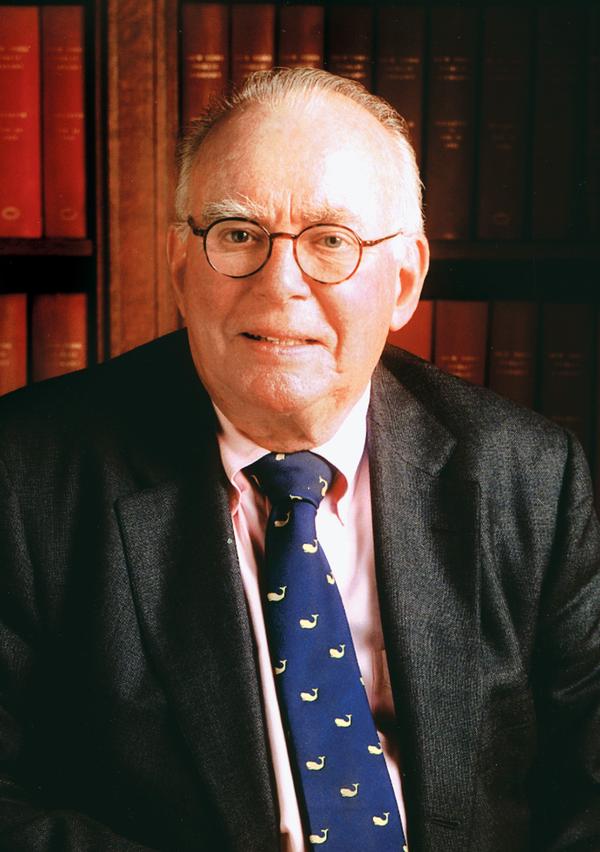Necrology
Because Hamilton Remembers


Richard Couper '44
Dec. 16, 1922-Jan. 25, 2006
Richard Watrous Couper ’44, LL.D. (Hon.) ’69, a distinguished educational leader and a life trustee and devoted supporter of the College, was born on December 16, 1922, in Binghamton, NY. The son of Edgar W. ’20, also a trustee of Hamilton, who became chancellor of the University of the State of New York, and Esther Watrous Couper, Dick Couper had numerous family ties to the College going back through six generations to its earliest years. He came to College Hill in 1940 from Binghamton Central High School, where his leadership qualities had already been demonstrated. On the Hill he joined Delta Kappa Epsilon, went out for basketball, track, and soccer, and lent his powers of persuasion to the debate team. Elected to Quadrangle and DT, he left the College in 1942, not long after U.S. entry into World War II, to join the Army. Commissioned as an officer in the Ordnance Corps, he served in the Aleutian Islands, becoming a company commander while stationed at remote Attu.
Released as a captain in 1946, after the war’s end, Dick Couper returned to College Hill to resume his studies. He was soon joined by his bride, the former Patricia Pogue, whom he had married on September 24, 1946, in Cincinnati, OH. He resumed his soccer career as goalie and, as a student government leader, helped resurrect numerous campus organizations that had been in abeyance because of the war. A member of the Honor Court and chairman of the Student Council, he was tapped for Pentagon, following in the footsteps of his father. He also excelled academically, became a part-time instructor in the history department, and was elected, like his father, to Phi Beta Kappa. Hailed by The Hamiltonian as “sincere, popular, able,” and for his character and intellect, he was awarded the prestigious James Soper Merrill Prize upon his graduation with honors in history and Greek in 1947.
After acquiring an M.A. degree in American history from Harvard University in 1948 (his love of history would be lifelong and he was particularly fascinated by the works of the historian Francis Parkman), Dick Couper returned to his native Binghamton to enter the insurance business. He was vice president of the firm of Couper-Ackerman-Sampson in 1962 when he responded to a call from his alma mater to return to College Hill as Hamilton’s first-ever administrative vice president. After serving as acting president of the College during two crucially transitional years, 1966-1968, he left the Hill as vice president and provost in 1969 to become New York State’s deputy commissioner of higher education.
In 1971, Dick Couper was appointed as the first full-time president and chief executive officer of the New York Public Library. During the ensuing decade he played a vital role in maintaining and preserving that great national repository of knowledge at an exceedingly difficult time in its institutional life. In an era when New York City was experiencing financial crisis, he succeeded in balancing the Library’s budget for the first time since 1924 while also raising substantial funds through gifts and grants, especially from the National Endowment for the Humanities and the Astor Foundation. In addition, he launched a successful program to computerize the Library’s card catalog, making it the first major library to do so, and saw to completion a new building in Harlem to house the renowned Schomburg Collection, forming the Schomburg Center for Research in Black Culture.
With the hard times weathered and the institution strengthened under his stewardship, Dick Couper left the Library in 1981 to conclude his highly fruitful career in educational administration as president of the Woodrow Wilson National Fellowship Foundation. In that post during the 1980s, he provided effective leadership in the Foundation’s efforts to enhance excellence in teaching and learning within the nation’s colleges and universities by inaugurating a series of new programs.
A remarkably vigorous and active man with a strong sense of commitment, Dick Couper served as a trustee or director of more than 60 organizations during his lifetime. They included for-profit corporations such as banks and publishing companies as well as numerous non-profit institutions , including major foundations. A longtime trustee of Wesleyan University, the Episcopal Divinity School, and the New York State Historical Association, he was a charter trustee of the Fund for the Improvement of Postsecondary Education and a founding trustee of the Lincoln Center Institute and of the New York Council on the Humanities. He also gave outstanding service to the national Phi Beta Kappa Society as president of the Phi Beta Kappa Associates.
However, it was to his alma mater that Dick Couper’s commitment was most enduring and unstinting. He was active already as a young alumnus, serving on the Alumni Council and chairing the Alumni Fund. First elected as an alumni trustee in 1959, he was named a charter trustee in 1967 and a life trustee in 1992, becoming one of the longest serving trustees in the history of the College. During the 1960s he chaired the Board of Trustees’ first long-range planning committee, which yielded the report that resulted in the establishment of Kirkland College, paving the way for coeducation on College Hill.
After his retirement from the Woodrow Wilson Foundation in 1990, Dick Couper and his wife Patsy settled on College Hill, where they built a home and became enthusiastically involved in the community. Dick, as a life trustee, also continued to demonstrate in countless and generous ways his ardent commitment to Hamilton. The College’s presidents as well as his fellow trustees enjoyed and valued his sage advice and astute counsel until virtually the end of his life. Within the College, and reflecting his love of books and devotion to libraries, he took a particular interest in the Burke Library, supporting it in various ways with his funds.
Beyond College Hill, Dick Couper was a generous supporter of community institutions such as the Kirkland Town Library and the Oneida County Historical Society. A lifelong Episcopalian, he also served on the vestries of his parish churches and additionally was active in the national Episcopal Church and the dioceses in which he resided.
Through the years, Dick Couper received much deserved recognition and innumerable awards for his achievements. They included a half-dozen honorary doctorates from college and universities in addition to the one from his alma mater in 1969. In 2004, the Alumni Association recognized his lifetime contributions to Hamilton with one of the last honors he was to receive, its Volunteer of the Year Award.
Richard W. Couper, who, despite declining health, remained actively engaged with the College until virtually the end of his life, died on January 25, 2006, while hospitalized in New Hartford. Patsy, his wife and wholehearted partner in all his endeavors for almost 60 years, was at his side. Also surviving are two sons, Frederick P. and Thomas H. Couper; a daughter, Margaret C. Haskins; and four grandchildren and a sister, Katharine Watrous, wife of the late Joseph B. Watrous, Jr. ’42. A son, Barrett W. Couper, predeceased his father in 2001.
In announcing to the Hamilton community Dick Couper’s passing, President Stewart observed:
Few people loved Hamilton College more than Dick Couper and few did more to nurture and sustain it. In simple and gracious ways, he and Patsy welcomed many of us into this community. During my two-and-one-half years as president, Dick was for me a trusted confidant, a patient advisor and someone with whom I talked often about Hamilton. He was warm and generous, witty and learned, a prolific writer and an exemplary orator…. His death is an immense loss for Hamilton.
Note: Memorial biographies published prior to 2004 will not appear on this list.
Necrology Writer and Contact:
Christopher Wilkinson '68
Email: Chris.Wilkinson@mail.wvu.edu

The Joel Bristol Associates
Hamilton has a long-standing history of benefiting from estate and life payment gifts. Thoughtful alumni, parents, and friends who remember Hamilton in their estate plans, including retirement plan beneficiary designations, or complete planned gifts are recognized and honored as Joel Bristol Associates.
Contact
Office / Department Name
Alumni & Parent Relations
Contact Name
Jacke Jones
Director, Alumni & Parent Relations
